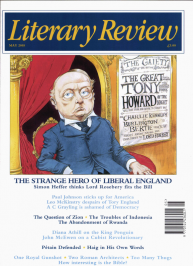Ophelia Field
Conversation Signifying Nothing
Look at the Dark
By Nicholas Mosley
Secker & Warburg 214pp £16.99
Nicholas Mosley has always written ‘novels of ideas’, and one admires his increasingly bold experimentation, even into his eighties; but what might have been intriguing as a short story this time struggles to hold together as a novel.
The narrator of Look at the Dark is a nameless, aging Englishman, a linguistics philosopher turned TV pundit – the career change an expression, apparently, of his belief in Middle Eastern Gnosticism. After being hit by a car, he is doped up with morphine to kill the pain of a smashed leg and head. Such an infirm narrator is not a bad metaphor for the Western mind today; or, at least, his state of mind – struggling between chaos and reason – fits well with Mosley’s ‘clash of cultures’ side theme. Moments when the narrator’s psychological crisis is reflected in social observation – as when he pinpoints the sickening vacuity within the cycles of public discourse since 9/11 – are sharp, but unfortunately few.
Through a not always successful interlacing of past and present, the narrator examines his life’s relationships. A recurring theme is the way that seemingly manipulative, selfish or morally suspect acts – such as following a little girl home on a bus – may be suddenly redeemed by chance, or, as

Sign Up to our newsletter
Receive free articles, highlights from the archive, news, details of prizes, and much more.@Lit_Review
Follow Literary Review on Twitter
Twitter Feed
The son of a notorious con man, John le Carré turned deception into an art form. Does his archive unmask the author or merely prove how well he learned to disappear?
John Phipps explores.
John Phipps - Approach & Seduction
John Phipps: Approach & Seduction - John le Carré: Tradecraft; Tradecraft: Writers on John le Carré by Federico Varese (ed)
literaryreview.co.uk
Few writers have been so eagerly mythologised as Katherine Mansfield. The short, brilliant life, the doomed love affairs, the sickly genius have together blurred the woman behind the work.
Sophie Oliver looks to Mansfield's stories for answers.
Sophie Oliver - Restless Soul
Sophie Oliver: Restless Soul - Katherine Mansfield: A Hidden Life by Gerri Kimber
literaryreview.co.uk
Literary Review is seeking an editorial intern.